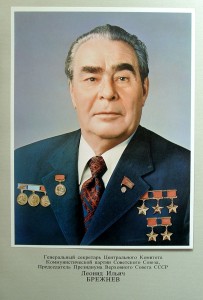Students in Karen Dawisha’s POL 471 class recently debated the motion “it would have been better for Russia had Brezhnev not died.” Drew Pinta makes the case for Brezhnev in this response.
It is difficult as a citizen of the West to defend a man such as Leonid Brezhnev, but when you analyze the views of the Russian people themselves, the true sentiment of his rule becomes perfectly clear. The memory of Brezhnev continues to remain strong in the minds of Russians three decades later. Sure, anything can be said with stats and figures, but to see the real impact of Brezhnev, one must focus on the very essence of his leadership. Despite what he was handed down in the mistakes of Stalin and Khrushchev, Brezhnev piloted a regime of external strength and prestige; his interests were clearly to maintain both Soviet stability and power at any cost, whether it was ushering in an era of détente, or invading Afghanistan or Czechoslovakia to restore order in the Soviet sphere. Brezhnev continually asserted dominance and obtained advantageous positions in international disputes, deterring the interests of China and the US, both major rivals. He chose not to get caught up in economic reforms that, if unsuccessful, may have endangered the very structure of the country. Instead, he elected to focus on the military to ensure the protection of his country from the rapidly increasing outside threats. It is easy to pick on the multitude of individual freedoms that were absent during Brezhnev’s rule, but we cannot hold the country to the standards of the United States. When put into context, it is certain that this lack of individual empowerment was to preserve the spirit of the collective, the core of Soviet ideals. And it is evident that many of these same freedoms are, to this day, absent in Russia.
All of these acts were necessary actions to ensure that the working order of things did not falter. I would refute any argument that the economy stagnated under his rule, because despite that, the people of the Soviet Union believed they were thriving. The Russian people were, for once, content. We know not what Russia would theoretically be like if Brezhnev was still around, but we do know what the USSR, and furthermore, Russia, looks like without him—collapse, chaos, discontent. The Brezhnev era continues to be fondly remembered by those who lived then, and it all comes from Brezhnev’s ability to keep the country steady and safe from external threat. And that perception, in itself, is perhaps more important than what the numbers say. It was real strength, strength of confidence and influence, which is something that Russians seem to have lost since then, and have struggled to regain to this day. The recent actions of Vladimir Putin and the criticism he receives only validate our argument. And so, I would argue that this evidence of Russian confidence and stability would have made an extended Brezhnev regime good for the Soviet system, and good for Russians in the long term.
Drew Pinta is a senior at Miami majoring in Political Science

